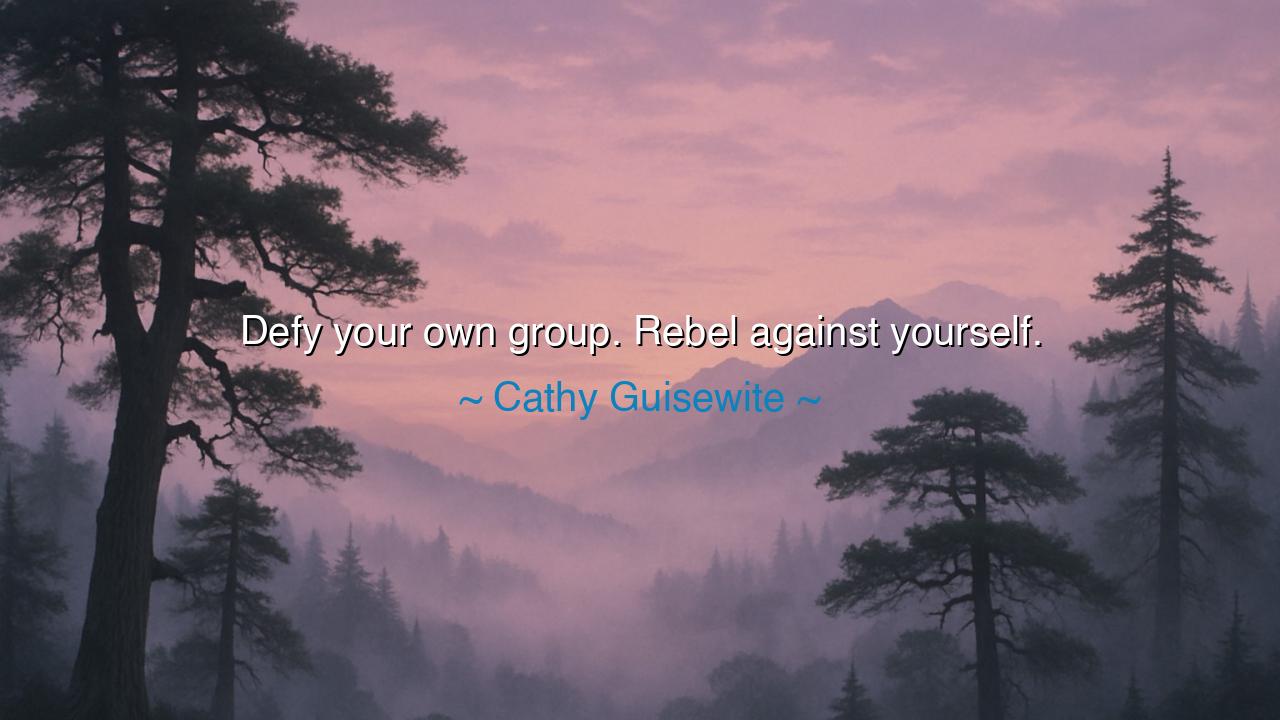
Defy your own group. Rebel against yourself.






In the long and winding journey of self-discovery, there comes a moment in the life of every individual when they must confront the forces that bind them—those that shape their identity, their beliefs, and their very sense of belonging. Cathy Guisewite captured this profound truth when she said, "Defy your own group. Rebel against yourself." These words speak to the very essence of growth, the act of questioning the norms that we often accept without challenge. It is in defying the very identities we inherit—whether from family, culture, or society—that we begin to discover our truest selves.
To understand the depth of Guisewite’s wisdom, we must look to the ancients, who recognized the power of self-revolution. In Greece, Socrates was a philosopher who lived to question and examine the very foundations of belief and knowledge. He famously declared, “The unexamined life is not worth living.” For Socrates, to rebel against the ideas handed down to him by society was not an act of defiance for its own sake, but a necessary step toward the realization of truth. Self-rebellion was an act of freedom, a way to clear away the dust of inherited ideas so that the individual could see with clarity and wisdom.
This concept of rebellion against the self is echoed in the Roman story of Cato the Younger, a man who defied the social expectations of his time by rejecting the luxury and corruption that so many in Rome embraced. Cato was known for his unwavering commitment to virtue and his disdain for the decadence that had overtaken the ruling class. But his defiance was not just against the society in which he lived; it was a rebellion against the temptations of the human heart—the desire for power, wealth, and status. Cato’s life was a manifestation of self-revolution, a constant battle against the darker inclinations of his own soul, and in his rebellion, he became a symbol of moral clarity.
In the Middle Ages, Saint Augustine of Hippo also underwent a transformation that can be seen as a rebellion against the self. Born into a life of indulgence and vice, Augustine experienced a profound inner struggle, torn between the desires of the flesh and the call of the spiritual. In his Confessions, he writes of his rebellion against his own desires, his rejection of the life he had been born into in favor of a higher calling. His self-rebellion was not just a rejection of his past; it was a turning toward a future defined not by the world’s expectations, but by his own spiritual truth. It is in this journey of self-confrontation that Augustine found his true path.
The idea of rebelling against oneself also resonates in the story of Mahatma Gandhi, who, in his quest for Indian independence, also sought to rebel against the limits of his own fear and cowardice. Gandhi’s battle was not just against the British Empire, but against the forces of oppression that resided within him—fear of authority, fear of confrontation, and even the fear of failure. In his struggle, Gandhi learned to rebel against his own inertia, to challenge his own passivity, and to embrace the transformative power of nonviolent resistance. It was in this profound internal rebellion that he found his voice, and through his actions, he inspired an entire nation to rise against an unjust system.
The lesson from Guisewite’s words and the lives of these great figures is clear: growth cannot happen unless we are willing to rebel against the forces that define us—whether those forces come from without, in the form of society, or from within, in the form of our own limiting beliefs and fears. Self-revolution is not about rejecting all that has shaped us, but about questioning whether those things truly serve the higher purpose we seek. Just as Socrates and Gandhi defied the norms of their time, so must we also learn to examine and rebel against the patterns in our own lives that hinder our growth.
In our own lives, we must practice self-reflection and courage. We must have the strength to look within, to question the assumptions that we have inherited, and to challenge the status quo of our thoughts and behaviors. Whether it is in our relationships, our careers, or our spiritual pursuits, there will come moments when we must rebel—against the parts of ourselves that seek comfort and conformity, and instead, choose to follow the path of truth and authenticity. As we rebel against the forces that bind us, we will find the true freedom that lies in our own hands, and with it, the power to shape a life that is worthy of the higher ideals we hold.






AAdministratorAdministrator
Welcome, honored guests. Please leave a comment, we will respond soon